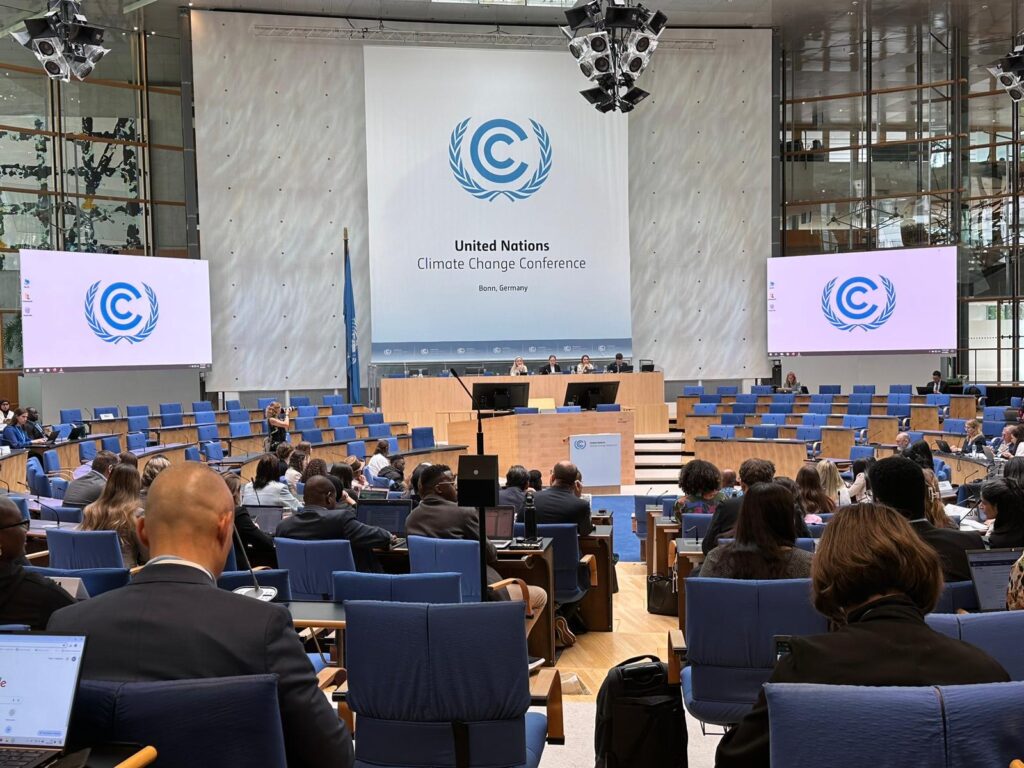Climate Education
Children and Climate Education: A Priority at the Bonn Climate Change Conference. Here’s Why.
June 2, 2024


There is something I wish I had learned when I was growing up in a state with mild temperatures and surrounded by freshwater lakes: the climate crisis does not impact everywhere and everyone equally. There might be floods in Louisiana and wildfires in Hawaii but as a kid growing up I only experienced a pretty temperate climate and very few extreme weather events, if any.
Later in life, as a teacher, I was cognizant of this and incorporated this concept, that we all experience the world differently, into my lessons on climate change.
Children are one group that we know are far more vulnerable to changes in the climate and are frequently more impacted by the effects of the climate crisis too. This is evident worldwide from the impacts of air and water pollution on children and infants and the risk of malnutrition, disease and even conflict climate pressures put on communities and countries. UNICEF predicts that one billion children are at ‘extremely high risk’ of facing the impact caused by climate change.
Children can see what is happening to the planet — they watch the news, they read online and what is more, when there’s climate related extreme weather, be it flooding, or snow storms, tornadoes or wildfires — they are often experiencing it directly.
Kathleen Rogers, President, EARTHDAY.ORG
Of course when these events happen, teaching can be severely disrupted as well as schools are forced to shut their doors.
But it’s not just negative practical impacts and hazards that children face from climate change events; additionally, young people are psychologically impacted by the climate crisis. We know that their mental health is suffering as a result of weather related anxiety. Children in the southern states of the US, India, Europe, the Middle East – have had to live through terrifying events and know that climate change is real. But that won’t ease their anxiety.
Luckily, this issue will receive attention at the United Nations Framework Convention on Climate Change (UNFCC), during their Bonn Climate Change Conference. Specifically at an event taking place on June 4th, entitled – ‘Expert dialogue on the disproportionate impacts of climate change on children and relevant policy solutions.’
This important dialogue will highlight how climate change impacts children and offer civil society, that’s organizations like EDO, a chance to promote what they see as the best policy solutions. For the past 54 years, EARTHDAY.ORG has been tirelessly promoting the value of education as both a practical and policy solution which gives children the information they need to understand the changing world around them and ease their anxiety.
It helps work their Green Muscle Memory so that they naturally and instinctively make planet friendly decisions, like picking electric cars over gas ones, rejecting single use plastics and opting for public transport where they can. It also gives them the skills, tools and inspiration to work in the Green Economy.
This is why EARTHDAY.ORG will continue our campaign championing climate education in every school from K – 12, at the Bonn Climate Change Conference.
To that end EARTHDAY.ORG recently released ‘Climate Education vs. The Climate Crisis’, outlining the need for climate education as well as the state of implementation around the world. Although some countries have made progress bringing the subject into classrooms EARTHDAY.ORG is calling on all countries to include formal climate education in their Nationally Determined Contributions (NDCs). Why? Because including climate education in NDCs ensures that educational systems support climate goals and foster a well-informed and solution-orientated population, especially youth, who are capable of driving and supporting climate action. And perhaps more importantly want to because they have been educated on what is at stake.
This is why we have committed to having a robust delegation from EARTHDAY.ORG on the ground in Bonn and it is why we will promote climate education to climate negotiators from around the world. EARTHDAY.ORG’s own president, Kathleen Rogers, Max Falcone, Climate Education Advocate, and Johnny Dabrowski, Coordinator of Climate Education Coalition, will be with me, actively contributing to these conversations.
EARTHDAY.ORG has always and will always view education as a critical tool for protecting our planet and combating the climate crisis. Saving the planet starts in the classroom.